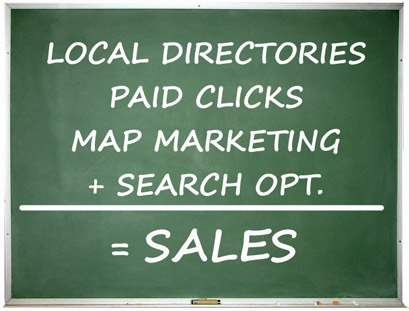5 Ways to Effectively Market Online in Your Local Market
Search engine marketing is the single most effective way to drive local traffic to your business website. The goal with any SEO program is to get your website to the top of the search results based on keywords of your business and your competitors. When your website dominates Google search results, you can be assured that the SEO strategies you are driving the optimal traffic to your business’ website.
There are four main types of search marketing tactics: natural search optimization, paid clicks or pay-per-click (PPC), local directories, and map marketing. Each of these unique tactics offers different advantages; it is when they are strategically blended together into an SEO plan they yield the best results. A comprehensive marketing strategy that includes all of these elements gives your website significant advantage over your competitors. The end goal is to have multiple listings on the first page of Google, which is when you know you are properly optimized. This ensures that customers seeking the products and services you offer find you first; the more times you appear on the first page of search results, the better chance you have of getting the customers you desire.
 Local Directories and Map Marketing
Local Directories and Map Marketing
Remember when you used the Yellow Pages to find a local business? It took forever to find the category you needed, and even longer to choose the company to call. Now, people just type their local search parameters into Google or other search engines to quickly and easily find local businesses. More and more consumers each year are turning to the Internet to research companies, products and services, before they buy. Search engine marketing is the key to harnessing the profit power of your local customer base; traditional Yellow Page advertising is expensive and doesn’t drive customers to your website that provides 24×7 information.
A typical search query by a potential customer often looks like this: “Manhattan Italian cuisine restaurant.” In a Google search, the search engine displays a local map of the area and the top 10 listings for restaurants in Manhattan offering Italian cuisine. Submitting a listing for your business to the biggest local search engines is undoubtedly a great way to drive local traffic to your website and to your business location as well, without the cost of paying for pay-per-click advertisements or other expensive off-line advertisements in your target area.
Natural Search Optimization
A natural search, also known as an organic search, mostly looks like a Google search on anything under the sun. Consumers use this to research products, services and companies before they buy. Of course, if your website doesn’t appear on the first page of results, your chances of increasing sales diminishes significantly. Of course Google isn’t the only search engine that consumers use; MSN, Yahoo!, Bing and Ask.com are important to note as well. Organic searches are the most reliable of all search engine marketing tactics and are the most reasonably priced to implement.
Search engines use automated software called crawlers to comb the billions of websites on the Internet and bring back the most relevant results for a certain query. These crawlers use algorithms that determine the relevance of these websites and their corresponding ranks on the search engine results page. It is for these crawlers that business websites are optimized to using various on-page and off-page SEO techniques. The most common of these is the use of relevant keywords and optimizing website content. Increasing the number of off-page links to your website is also very effective. It should be noted, though, that the algorithms used to evaluate a website change every now and then to prevent business owners from designing their websites to be fully optimized for a Google search but not for the audience.
Paid Search (Pay-Per-Click)
More commonly known as pay-per-click advertising, paid searches are the fastest way to make your business visible to your target market. Unlike a local search and a natural search, though, paid search requires an initial investment, albeit smaller than the investment you put in traditional advertising media, to pay for every time a person clicks on the link to your website. In a Google search, a paid search result appears in the form of an advertisement on the top right side of the natural search results, allowing your users to see you right away instead of having them rifle deep into the search results first.
To succeed in business today, you must have a comprehensive search engine optimization marketing plan. It is not longer just about the number of visitors you receive to your site each day, it is also about the quality of the visitors, and how your website turns them into buyers. When you are ready to expand your customer base, grow your business, and experience greater revenues, it is time to implement an SEO plan that incorporates local search, map marketing, pay-per-click, and organic search to draw potential customers from your service area.
Push Local specializes in online marketing for small businesses. Our services include search engine optimization, pay-per-click advertising, map marketing, and local directory submissions.











